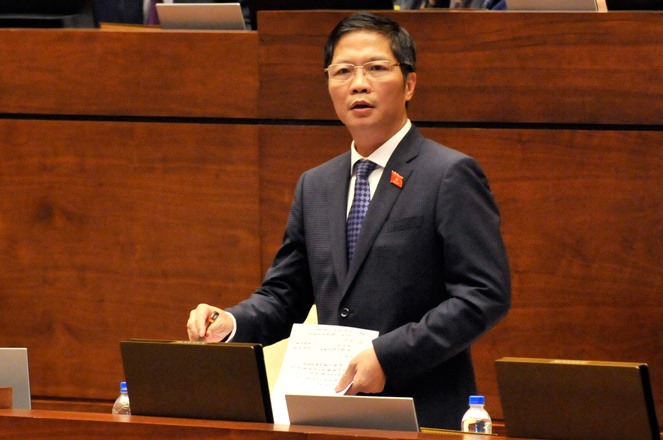 Politics & Law
Politics & Law

Minister of Industry and Trade (MoIT) Trần Tuấn Anh was the first Cabinet member to go before the first 14th National Assembly hearing session yesterday.
 |
| Industry and Trade Minister Trần Tuấn Anh yesterday rejected allegations of “interest groups” influencing the approval and management of mega-projects that have had serious socio-economic and environmental impacts. — Photo enternews.vn |
HÀ NỘI – Industry and Trade Minister Trần Tuấn Anh yesterday rejected allegations of “interest groups” influencing the approval and management of mega-projects that have had serious socio-economic and environmental impacts.
Answering questions posed by deputies at the National Assembly hearing, he said sustainable and equitable socio-economic development was a shared goal.
Anh was the first Cabinet member to go before the first 14th National Assembly hearing session yesterday.
Fielding the first question by Nguyễn Tiến Sinh, a deputy from Hòa Bình Province, about State-funded projects managed by the MoIT making huge losses, the minister said several factors were involved, including volatile world prices.
He cited as examples five projects delayed for a long time: the Thái Nguyên Iron and Steel Plant, the Phương Nam Paper Pulp Mill, the Ninh Bình Fertiliser Factory, the bio-fuel plant at Dung Quất and the Đình Vũ Fiber Mill.
Anh said all five projects had suffered from fluctuations in the world market, particularly the sharp drop in oil and crude oil prices from US$100-147 to $40 per barrel.
The limited capacity of investors, project management boards, negotiation teams and contractors were other factors in the inefficient operation of such projects, he said.
He emphasised the goal of retaining State capital, assets and interests in dealing with such projects. He also said that all solutions should be in accordance with market principles and international commitments.
“We can consider selling those projects and even declare bankruptcy if necessary,” the minister said, adding that his ministry has recommended solutions to the Government. Specific measures would be decided when the Government meets after the current NA session, he said.
The issue of fake, poor-quality fertilisers was raised by many deputies during the hearing.
Anh admitted overlapping State management of the fertiliser market hindered efforts to restore order. At present, the MoIT oversees the production and trade of inorganic fertilisers, while organic fertilisers come under the management of the Ministry of Agriculture and Rural Development (MARD).
Another problem is that too many different kinds of fertilisers have been permitted to enter the market, with one count putting it at more than 5,000 organic and 5,700 inorganic fertilisers.
The MoIT and MARD have held many working sessions to address those problems. Most recently, the two ministries have proposed that the Government assigns one ministry to manage fertiliser products and the market, while relevant ministries and agencies co-ordinate to reduce the number of types of fertilisers allowed in the market, Anh said. He pointed to Thailand as an example, noting that the kingdom only allows the production and sale of a little more than 100 different kinds of fertilisers.
The MoIT is working on a set of 16 standards for fertilisers, and this could be forwarded to the Ministry of Science and Technology for approval early next year, the Minister said.
Explaining the issue further, MARD Minister Nguyễn Xuân Cường pointed to other major problems, including orientations in the use of fertiliser.
Việt Nam consumes 10-11 million tonnes of fertiliser each year, and 90 per cent of these are chemical fertilisers, according to the minister.
This is a major factor affecting the quality of farm produce, not to mention the pollution and soil degradation this causes.
“It is the responsibility of the agricultural sector to promote the use of organic fertilisers and gradually shift to clean agricultural production, which is in line with the Party and State’s policy on restructuring agriculture,” he said.
Many deputies wanted Minister Anh to report on action taken against violations of rules in water discharge at hydropower plant reservoirs.
Anh said his ministry had compiled a 20-page report on the planning of hydropower plants and was reviewing their licences and operations.
“We do not develop hydropower at any cost, and this is the guiding viewpoint of the Party, State and Government,” he said, reaffirming that the ministry has reviewed and considered the elimination of projects that can affect the environment and local people’s lives.
The minister said there were 336 hydropower projects mostly under his ministry’s management, while the Ministries of Construction, Natural Resources and Environment, and Agriculture and Rural Development also exercised control over several aspects of the same projects.
In the time ahead, the MoIT would assess water discharge procedures at hydropower plants and review flood and storm response work in localities where there are such plants.
The ministry would assign clear responsibilities of all concerned parties, such as local authorities, dam owners, plant investors in the water discharge process, along with sanctions for any violations.
Questions by Phạm Minh Hiền, a deputy from the central Phú Yên Province about the recent serious environment disaster caused by the Formosa’s waste discharge to the sea areas in the central region, were put forwards to the MoIT minister focusing on why there was not yet a specification and clarification on individuals and organisation’s responsibility for the incident.
Hiền also requested an explanation on whether there was a so-called group benefits in many supplementary projects such as the Cà Ná steel production project implemented by the Hoa Sen Corporation in the southern Ninh Thuận Province which local people worry could cause serious environmental pollution in sea areas.
Anh reiterated that the country would never accept an environmental trade-off for industrial projects, no matter what the cost.
“I affirm again that there has been no so-called group benefit in such projects. We are looking forward to sustainable socio-economic development that ensures adequate provision of materials to all key industries,” said Anh. — VNS




